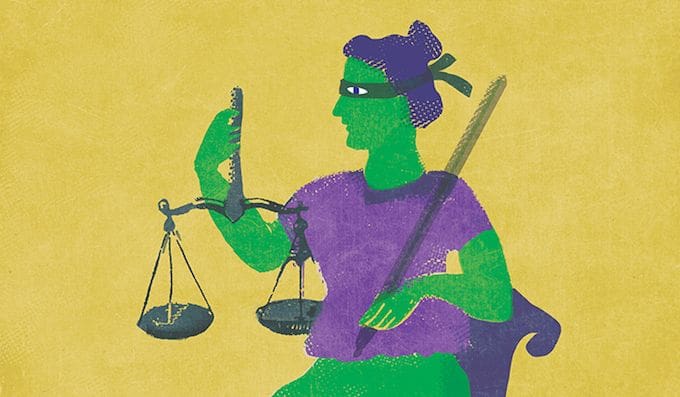Article originally published on May28th, 2019.
The vibrant debate around the question of basic income has all too often neglected a crucial aspect: gender dynamics. In a deeply gendered society, how might a basic income impact men and women differently? Could basic income be harnessed as a tool in the fight for women’s rights? Bringing a feminist perspective to the basic income discussion foregrounds a distinct set of concerns and virtues of the proposal. Natalie Bennett recalls the long 20th-century history of women’s struggles in the UK to make the feminist case for a universal basic income.
It is telling that, in the United Kingdom at least, women were at the forefront of early campaigns for a universal basic income.[1] It has even been claimed, with some justification, that Virginia Woolf, in asserting a woman’s need for 500 pounds a year and a room of her own, was setting out at least the case for a universal basic income, if not yet a model for it.
The campaigner Lady Juliet Rhys-Williams, with a pre-Second World War background in maternity and child welfare, set universal basic income out as a less gender-discriminatory and labour-based alternative to the UK’s Beveridge welfare state model in her book Something To Look Forward To in 1943.[2] However, the Beveridge model (whereby incomes such as pensions are based on contributions rather than need – something that has trapped older women too often in desperate poverty) triumphed, geared as it was to the needs of the capitalist growth economy. The model’s architect, William Beveridge, came under significant attack from a range of women for these aspects of his plans, notably from Elizabeth Abbot and Katherine Bompas of the women’s suffrage organisation Women’s Freedom League, who said his was “a man’s plan for man”. But the Labour Party that would deliver the plans – and certainly the Conservatives who would acquiesce in them for decades – were unlikely to take up such a challenge and act on it.
It is important to keep highlighting that history today, when male tech billionaires like Elon Musk, Sam Altman, and their ilk are creating a splash with their championing of universal basic income for a (possible) age of technological triumph. Many women were here first and must not be forgotten.
How the feminist vision of basic income took hold
It was often women who, in the UK, continued the push for universal income through the decades that followed. That most notably included the successful campaign for a universal child benefit, introduced in 1946, led by the strong-minded and determined Member of Parliament Eleanor Rathbone. That universal benefit was only recently (in 2013), and disgracefully, dropped with little fanfare, under the 2010-2015 coalition government of the Conservative and Liberal Democrat parties. Campaigning, however, never really achieved traction beyond support for children (and implicitly their mothers) with the public or the largest, massively male-dominated political parties, which in the British winner-takes-all first-past-the-post electoral system, are the only ones who have been able to introduce structural changes.
The feminist case for a universal basic income often starts, as Flanigan does, from the fact that women in the UK, as around the world, are more likely than men to be poor.
Yet the push continued. In 1984, the National Council for Voluntary Organisations in the UK proposed a universal basic income, saying that women would be the main beneficiaries, no longer dependent on their husband’s earnings (along with the unemployed, who wouldn’t be caught in what we now call ‘benefit traps’).[3] In 2001, Philosopher Ingrid Robeyns again set out the case for a universal basic income, pointing out how the welfare states of Western Europe had developed in a very different age, one of stable, secure jobs and marriages, and a highly gendered division of labour, with men allocated to the bread-winning role.
In recent years, the feminist case, like the broader case, for universal basic income has been gaining traction. University of Richmond academic Jessica Flanigan wrote in a millennials’ journal of choice, Slate, that it is a “feminist cause”. The feminist case for a universal basic income often starts, as Flanigan does, from the fact that women in the UK, as around the world, are more likely than men to be poor. But at its heart is the fact that women are more likely to be responsible for the care of the young and the old, work that is very often entirely unremunerated, sometimes not chosen, and not respected. The phrase “I’m just a housewife” was often heard thirty to forty years ago. That might be less the case now, at least in ‘polite’ public discourse, but that does not mean these caring responsibilities have become properly respected or valued, either in the lives of individuals or at the national level (in the form of GDP).
That is not a new situation, but the pressures of a carer’s life, in a world in which people are being told increasingly to ‘sell themselves’, to be a ‘product’, to always be ready to seize opportunities, have become more acute than ever. A grinding life of poverty, caring for aged parents, an ailing husband or wife, or a disabled child, leaves little space for a sparkling Instagram account or Facebook feed, the development of a ‘look’ or a ‘brand’, or the upbeat manner and the kind of ‘people skills’ demanded now even for many minimum-wage jobs. Equally so with the nature of modern employment. It might look like the gig economy lends itself to fitting around the demands of caring responsibilities, but instead its workers are increasingly expected to fit their lives around its demands.
Fostering solidarity
There has also been a growing focus on the way in which a universal basic income could address the disempowerment of poverty and destitution (that results from a UK welfare system increasingly under threat). With benefit sanctions affecting almost one in four Jobseekers’ allowance recipients between 2011 and 2015, and benefits of 132 million British pounds being withheld in 2015 alone, desperation is a condition all too familiar in many communities, with women often being the ones left to pick up the pieces.
And it is the most vulnerable who are likely to suffer the most. The deputy leader of the Green Party of England and Wales, Amelia Womack, wrote online in the British newspaper The Independent in 2018 about universal basic income’s value to some of the most vulnerable women in society: victims of domestic violence and abuse. By contrast, the universal credit system being implemented by the Conservative Party sees household payments all being aggregated into one (except by special request), making it even harder for vulnerable women to escape abusive situations.
A German study found that incapacity to meet employment demands, and particularly lack of opportunities due to discrimination by employers, was preventing older women and men from remaining in the labour market when they wished to do so, frequently forcing them to take pensions at a lower rate earlier than they would have wished, condemning them to an old age of poverty and insecurity.[4] This is the situation of a group of women known as the WASPI in the UK (Women Against State Pension Inequality). Born broadly in the 1950s, they have been adversely affected by rapid increases in their state pension age, bringing them to equality with men (with which few argue as a principle) but with little time to plan and prepare, and in many cases no official notice (and often personal knowledge) of the change in their circumstances. A universal basic income would ensure they were not forced into humiliating, often health-damaging, requirements for the receipt of the very low unemployment benefit, with little chance of gaining employment.
That a universal basic income might smooth the way to more gradual retirement, through a phased process of gradual disengagement from waged work, is not a particularly feminist point, but it is a significant one for many women.
There are some further groups of women who might particularly benefit: those working in low-paid jobs with low rates of unionisation and relatively toothless unions representing them, such as shopworkers and cleaners. This applies particularly, but not exclusively, in the case of the UK, with its highly repressive anti-union legislation.
No miracle cure for all society’s ills
There is, it has to be acknowledged, a genuine and progressive case made in some quarters against universal basic income from a feminist perspective. The chief claim is that it could, by guaranteeing women basic subsistence, render them even more exposed than they are now to social pressures to take up unpaid care and even community responsibilities, condemning them to lives of low incomes, limited opportunities, and lower status. The case was made two decades ago that one of the early forms of extended parental leave in Belgium, a payment for up to three years during career interruption, was – as might have been expected around the turn of the century – chiefly taken up by women.[5]
A struggle for universal basic income needs to be combined with the struggle for an equitable sharing of care responsibilities.
This, however, brings up a very broad and important point about universal basic income. It is not a panacea, a solution to all of society’s ills, including misogyny, discrimination, and a failure to respect caring and community roles. Few of its proponents have suggested that it is. So, in some respects, this is a ‘straw woman’ argument, although it does highlight the point that a struggle for universal basic income needs to be combined with the struggle for an equitable sharing of these responsibilities – for shared parental leave, for respect for the role and difficulties of caring, and adequate recognition of it by employers, families, and society in general.
As argued elsewhere against those who suggest that universal basic income could pose a threat to universal basic services, universal basic income would only threaten to impose an ideology of women being forced into home and caring duties in a society with politics whereby this could be conceivable or acceptable. In an equitable society, or one working towards gender equality, such a claim would not stand up to scrutiny.
It can be argued, then, that the struggle for a universal basic income is a struggle for all women’s groups and feminists. Recognising that all members of society deserve a fair basic share of its resources, enough to meet their basic needs, because they all in some way or another contribute to it by their existence, strengthens the position of women, and all of their other struggles: as workers, as family members, as people in need of respect as well as material resources. When women fully secured the vote in 1928 in the UK, many thought they were well on the way to respect for women’s contributions to society. It is obvious that progress has been glacial since then, and a universal basic income for everyone could be an important step further along that road.
[1] Sloman, P. (2015). “Beveridge’s rival: Juliet Rhys-Williams and the campaign for basic income, 1942–55,” Contemporary British History, pp. 203-223.
[2] Sloman, op cit, p. 203.
[3] Hencke, D. ”Basic income ‘should replace benefits’ The Guardian (1959-2003); Jul 31, 1984; ProQuest Historical Newspapers: The Guardian and The Observer, p. 4
[4] Wübbeke, C.J. (2013). “Older unemployed at the crossroads between working life and retirement: reasons for their withdrawal from the labor market,“ Labor Market Res. 46: 61.
[5] Robeyns, op cit, p.85.





















